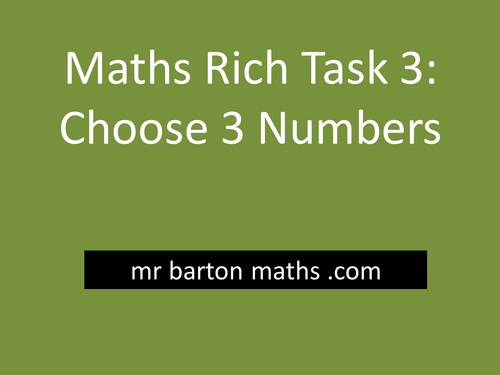

Something went wrong, please try again later.
Another wonderful resource - thank you so much!
A fascinating resource by Mr Barton which develops students' investigative skills. What is particularly impressive about this task is that students of all ages and ability can access the task and high achievers can take it as far as they want.
Another excellent resource - I especially like the ideas, in Mike's PDF, about using the three numbers to find pairs of points leading to triangles, hexagons and triangular based prisms. I shall be trying these ideas soon.
Choose 3 Numbers Probing Questions / Lines of Inquiry<br /> <br /> • Can you describe a method for finding the original 3 numbers?<br /> • Can you use algebra to find a method?<br /> • Can you tell from your 3 totals if the original 3 numbers were all odd? How about all even?<br /> • If your original 3 numbers are part of a linear/arithmetic sequence, is there anything special about the 3 totals? How about if the totals are part of a sequence, is there anything special about the original 3 numbers?<br /> • Give someone 2 sets of 3 totals, where one of the original numbers is common to both sets. Can they find it?<br /> • Give someone one of your original numbers and two of the totals of the sums. Can they find your original 3 numbers?<br /> • If two of my totals are negative, does that mean two of my original numbers have to be negative?<br /> • Can you think of numbers that give two totals that are the same?<br /> • Can you make three totals that are consecutive numbers?<br /> • What is it about the 3 totals that determines:<br /> o If the original 3 numbers are all positive<br /> o 1 is negative<br /> o 2 are negative<br /> o All 3 are negative?<br /> <br /> <br /> <br /> <br /> Possible Modifications<br /> <br /> • What if you know the differences of the pairs instead of the sums?<br /> • Can you figure out the original 3 numbers if the totals are: 1st + 2nd, 2nd + 3rd, and then those two totals added together?<br /> • If you multiplied the pairs of numbers instead of adding and gave someone your totals, can you find out their numbers then?<br /> • If I just randomly picked 3 totals, could you find me 3 pairs of numbers that gave those totals (if the 3 numbers don’t have to be whole numbers)?<br /> • If your 3 original numbers are surds, and you multiply the pairs, can you come up with 3 whole number totals?<br /> • If you multiply in pairs and get 3 totals, is there a way of telling if you original 3 numbers were whole numbers?<br /> • What about with 4 numbers adding together all the pairs?<br /> • What about with 4 numbers adding them together in groups of 3?<br /> <br /> <br /> <br /> <br /> <br /> <br />
Report this resourceto let us know if it violates our terms and conditions.
Our customer service team will review your report and will be in touch.
